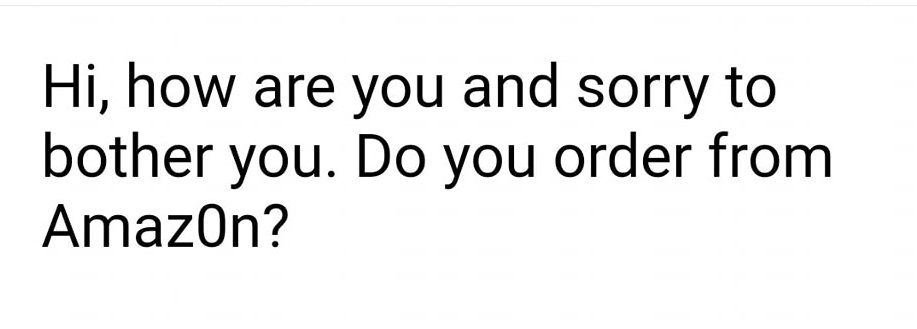Be aware of gift card scams this Christmas

They're easy to buy, easy to share and hard to trace – which is why scammers have long seen gift cards as a way of stealing money from victims.
Which? has previously warned of fraudsters impersonating one of your email contacts to ask you to buy a gift card for them as a favour.
Typically, victims receive a scam call designed to panic them into acting fast and thinking later. Pretending to be from HMRC, your bank or even your utility company, the fraudster tells you that you owe money, perhaps, or have been the victim of fraud.
They then ask you to make a payment using a gift card. After you've bought the gift card, you’re asked to share with the fraudster the code that's on the back.
Read on to find out about different types of gift card scams, so you know what to watch out for.
Sign up for scam alerts
Our emails will alert you to scams doing the rounds, and provide practical advice to keep you one step ahead of fraudsters.
Sign up for scam alerts
Impersonation scams
Fraudsters hack your email account and send an email asking you to buy them a gift card for a made-up reason. Usually, this reason is emotional, or there's a sense of urgency around it. The sender may claim to be a friend or family member.
One member, who wished to remain anonymous, shared a scam like this using our scams sharer tool. She received an email from a friend's email address asking if she could help her get an Apple gift card for her niece, who was suffering from cancer.
‘I was caught off guard on a Sunday and sent a £200 Apple e-voucher to what I thought was my niece's email,’ she explained.
Once she had purchased the gift card, her ‘friend’ kept emailing to say it hadn’t arrived yet. ‘Overnight those warning bells rang and I checked the emails again to find that this time, they were highlighted as possible spam.’
Fortunately, the payment was declined, but as a precaution, she called her credit card provider and cancelled the credit card. She changed her email password and reported the scam to Action Fraud and Which?.
Fake reviews

Sometimes dodgy sellers on Amazon send letters through the post asking for a five-star review in exchange for an Amazon gift card. A member of the Which? Scam Action Facebook group received a letter asking for a review in exchange for a £10 Amazon gift card.
While this may not seem dodgy, fake reviews can help dubious retailers and scammers sell non-existent products or items that don’t meet the required criteria under the Consumer Rights Act 2015. You should therefore only write genuine reviews.
Last year, Amazon filed legal action against the administrators of more than 10,000 Facebook groups that ask for fake reviews. The fake review groups operate on Facebook and aim to find people willing to write misleading reviews in exchange for vouchers, money or free products.
Free gift cards and fake competitions

Fraudsters send emails and texts or create social media posts and ads promoting non-existent gift cards at well-known retailers.
These lead to phishing websites where you’re sometimes asked to fill in a survey, giving away data that could be used to scam you at a later date. Typically, these scams end with you paying a small fee to have the card delivered and parting with your financial information in the process.
In one example Which? came across, an email promoted a chance to win an Amazon gift card worth £1,000. It went on to ask for your first and last name, email, date of birth, postcode and mobile number, telling you that prize winners would be contacted by telephone.
Purchase scams
When you're shopping online, be suspicious of items that you can pay for using a gift card, as this could be another way for scammers to obtain gift cards and make off with the money.
Products sold at super-low prices or with unbelievably big discounts (80% or 90% off) may be listed to lure you into a purchase scam.
Amazon warns of vehicle purchase scams, where vehicles are listed for sale online at prices that are too good to be true by a seller who claims they need a quick sale. They usually cite some sort of life change, such as moving home or being called up for military service. The seller then asks you to make a payment using Amazon gift cards.
If you’re selling something online, a scammer may also ask to pay for your item using a gift card.
Avoiding and reporting gift card scams
If you receive an email from a friend or family member asking you to buy a gift card on their or someone else’s behalf, contact that person using a different method to verify it’s them. You can also get them to check haveibeenpwned.com, which will tell you if an email account has been hacked.
It’s also a good idea to set up two-factor authentication on your accounts, making them harder to be hacked.
Any competitions, messages or calls you receive or come across that promote or ask you to buy gift cards should be verified by checking the brand’s official website and social media accounts.
If someone you don’t know or trust asks for the details on the back of a gift card, don’t give them to them, as this will allow the fraudster to spend the money on the card. They can also do this if you share links received via email for electronic gift cards.
If you have been the victim of a scam, call your bank immediately using the number on the back of your bank card and report it to Action Fraud, or call the police on 101 if you’re in Scotland.





